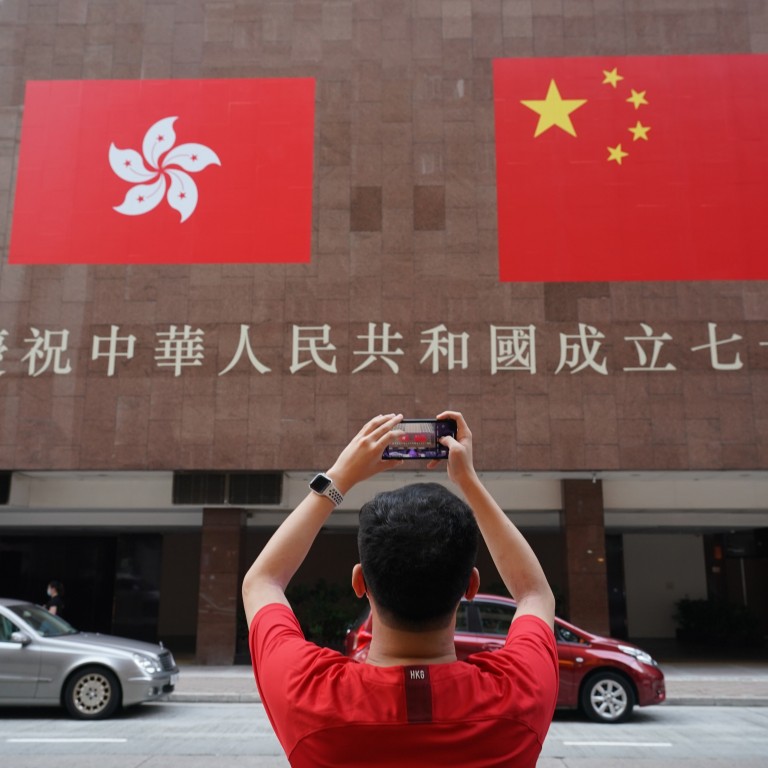
Hong Kong, Beijing authorities ramp up calls for patriotic education, warn against National Day protests
- Director of liaison office Luo Huining stresses to civil servants and youth that loving country ‘not a choice but a duty’, noting new security law had ‘ended madness’
- Police arrest two men over online messages inciting violence or unauthorised assembly
Beijing and Hong Kong authorities ramped up calls for patriotic education and warnings against banned anti-governments protests over the mid-autumn festive season, as police made more arrests on the eve of China’s National Day amid fears of potential chaos.

Police officers from the Cyber Security and Technology Crime Bureau on Wednesday arrested two men, aged 20 and 30, for allegedly posting messages on internet platforms, including the Telegram messaging app and LIHKG forum, to “incite others to commit wounding with intent” or “incite others to take part in unauthorised assembly”.
Some of the posts mentioned “killing police officers” and “setting police vehicles on fire”, Chief Inspector Fan Chun-yip said. The arrested pair had been active in spreading hate messages online inciting others to take part in illegal activities since mid-2019, he added.
Officers arrested them in Tuen Mun and Wong Tai Sin, also seizing three mobile phones and two computers.
Three additional suspects were detained over inciting others to commit arson and public nuisance, as well as to take part in unlawful assemblies.
Arrests, resignation, suspension: Hong Kong’s third month under security law
The front said the march would not be held, but asked supporters to dress in black on Thursday and “use their own ways” to express their dissent.
Protest plans appeared to be in coded language on social media. On Wednesday night, some users in a Telegram channel were sharing a post that called on people to join a “shopping spree”, patronising malls located along the banned protest route to “celebrate” National Day.
In another Telegram group, a post suggested users “pack up their mooncakes” and wait for instructions in the afternoon.
Police are expected to deploy thousands of additional officers to maintain order, fearing a repeat of past events when protesters have taken to the streets regardless of restrictions.
Hong Kong police arrest three over calls for violence on National Day
“The National People’s Congress enacted the Hong Kong national security law to end the madness of Hong Kong independence advocacy and the black violence that ran out of control,” Luo said, referring to the colour worn by anti-government protesters.
Luo also serves as city leader Carrie Lam Cheng Yuet-ngor’s adviser on the newly established local Committee for Safeguarding National Security.
The law was a “sharp sword hanging high” over those planning illegal demonstrations on National Day, the liaison office warned in a statement on Tuesday.
Luo called for Chinese national consciousness and patriotism among Hongkongers to be bolstered urgently.
“As Chinese, loving the country is not a choice, but a duty and, even more so, the correct path,” he said.
Civil servants and young people in particular should receive increased education on national security, the country’s situation, Chinese history and culture, the Chinese constitution and the city’s own mini-constitution, the Basic Law, he said.

Under the national security law, Hong Kong civil servants must now take an oath to uphold the Basic Law and pledge allegiance to the city.
For those who joined the government after July 1, the oath will be compulsory before assuming a permanent post, while the arrangement for existing civil servants is still pending consultation with unions, according to civil service secretary Patrick Nip Tak-kuen.
Civil servants supporting the protest movement have staged multiple demonstrations against the government during the social turmoil, and some have been arrested in connection with unauthorised assemblies.

In a letter to staff, Nip said a total of 46 civil servants had been suspended after being arrested or prosecuted over illegal public events as of the end of September.
In a separate statement, the Security Bureau said authorities were aware of online calls for protests in various districts across the city on Thursday, and warned that police would strictly enforce the law to ensure public safety.
“Some even advocate the use of violence, including attacking police stations, hurling petrol bombs and illegally blocking roads, blatantly defying the rule of law and seriously jeopardising public peace and social order,” it said.
The bureau warned that those who joined unauthorised protests faced a maximum penalty of five years’ imprisonment, while those convicted of rioting could be punished by up to 10 years behind bars.
Secretary for Education Kevin Yeung Yun-hung also warned pupils not to participate in illegal protests and stay away from sites where demonstrations could potentially take place.
“[The calls for protests] and even the use of violence are extremely worrying. I hope to urge parents and pupils to mind their own safety at all times, and stay away from areas where such protests may happen to avoid being a part of them either intentionally or unintentionally,” Yeung wrote on Facebook on Wednesday.



